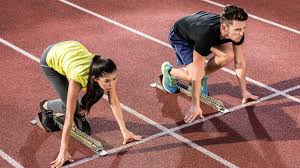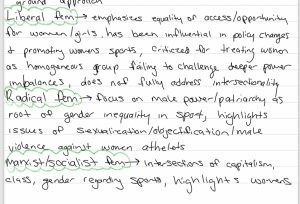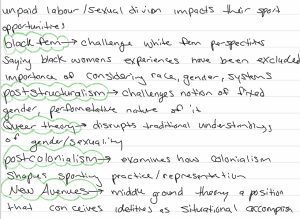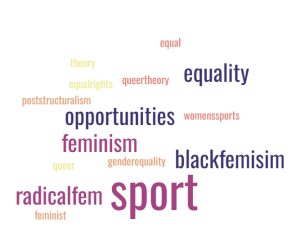1
Section One: The Fundamentals
A) What do we know about sport? What are common assumptions we make about sport and society?
Sport builds character
sport provides opportunities for social mobility
sport encourages teamwork and unity
sport reflects values and social norms
sport transcends politics
sport speaks a universal language
sport is a measure of individual merit
|
There could be many factors to this statement that can be untrue. For one, when going into a sport and thinking about it building character, there must be some internal motivation. For example, many children are put into sport by their parents. Some children love it while others are only there because their parents want them to be. If the child is not internal motivated and engaged with the sport while participating, it can be argued that it is not building character. If the child refuses to participate, or doesn’t enjoy the activity, it creates a block that will only allow the participant to focus on the negative rather than building character within. |
Exercise 3: Notebook prompt
What are some other metanarratives about sport that you are familiar with? Find an image or video clip or draw something yourself that captures this idea…
Gendered sport: the narrative that different sports are gendered. The “performative” sports like gymnastics and synchronized swimming are ‘feminine” and only available for women. Sports that are “performance” based (hockey, basketball) are ‘masculine’ and only available to men.
So what? Why does any of this matter? Does it matter? As something we grow up with – live with – play through – we don’t often interrogate the meanings of sport, and perhaps we don’t want to.
But being aware of these assumptions and metanarratives is especially important, I would argue, because of the centrality of sport to our everyday lives, the role that sport plays in shaping our childhood and worldviews and….. [finish that thought]
| our belief systems, how we interact with others, our perspectives
|
B) What is social justice?
Exercise 4: Padlet Prompt
Think back to the last section and try to look at some of the ideas we discussed differently. How might sport and social justice actually co-exist?
Record any images, video clips, or gifs you added to the padlet and identify a point of intersection between sport and social justice (can be an issue or a barrier or a debate or something you would like to explore in more depth in this course) . Screenshot or paste in your response below.
| Community Engagement:
Social justice intersects with community engagement in many ways. Social justices activists states that “social justice is a communal effort dedicated to creating an equal society in which each person and all groups are valued and affirmed”. This definition can be related to social justice in the form of community engagement. A common barrier to accessing sport is the lack of resources or funding. This is especially an issue in rural Indigenous communities as they already have a lack of funding from the government for basic needs to live. This barrier negatively impacts the youth of these areas. They are not able to access the same opportunities as other youth from more “wealthy” areas. While, I do not know first hand the direct impacts this could have on the individuals wishing to participate on sport. I would be interested to know
|
C) Social Justice Reading
(note: this activity is optional!)
D) KINESIOLOGY AND SOCIAL JUSTICE
Exercise 5:
social justice is a difficult concept to identify because of its: potential for dilution because of multitude of definitions, dynamic nature and meaning, it is a process as well as a goal, conflation with other concerns like multicultural education, critical pedagogy, postmodernism, post colonialism, and queer theory
how does mainstream discourse construct marginalized populations as “being-at-risk” for health and fitness issues?
it suggests they lack capacity for self compliance in health and physical education, self discipline, self management skills
According to the authors of this article, by making health and fitness a matter of personal responsibility, individual choice and moralized practices, healthism obscures and glosses over issues of privilege, discrimination, and social inequalities.
Exercise 6:
What are the implications of bodies-at-risk discourse and the refusal to understand the health gap from a social justice perspective, according to the authors of this article?
| Not being able to understand the discourse of bodies-at-risk and refuse to understand the health gap pushes away from the ideals of what social justice stands for. not understanding these discourses creates inequalities and unequal opportunities. As the article states that minority populations are labelled under “bodies-at-risk” because they lack the self-management, self-discipline and self-compliance in phy ed in contrast to white people (pg 229). This is an extremely problematic view to have. As this places blame on the individual rather than the system the are in. It is also pushes racist ideals. Saying minority groups lack these things while majority groups do not creates a harmful narratives towards these minority groups.
As a result, the author explains that the minority groups are a problem needing to be fixed. Rather than seeing society as the problem
|
Section Two: Sport Feminism
Exercise 7: Notebook Prompt
What is feminism? What does it mean to you? Choose one of the images below and explain how it captures your understanding of feminism (or find one that does speak to you and paste this into your pressbook with an explanation of why it matters to you.

| Feminism to me is equal rights for women. I hate the argument that feminism is women superiority. Many men still have this idea in their heads that women do have equal rights, opportunities, lives as themselves. Therefore, they think that feminism is dumb. This is not the case. Many girls and women do not have the same opportunities’ as men. Whether that be less pay, limited access to abortion care, and micro aggression’s in their everyday lives.
This image speaks to me because of the idea that women aren’t able to do certain things men can do. To that I say “F that!” When people underestimate us simply because we are female, it creates a really harmful narrative that seeps into society, as it already has.
|
Exercise 8: Notes Prompt (optional)


NB: Cornell notes is a great resource that teaches effective notetaking. Unfortunately, our system can’t save notes taken in the H5P app, so this is fully optional.
Exercise 9: Crossword Activity
Across:
5. fluidity
7. serena
8. malestream
10.underresprestation
11. heterosexy
12.socialization
13.invisibility
Down:
1.relativism
2.capitalism
3.reform
4.rich
6.performativity
9.essentialism
Exercise 10: Padlet Prompt

|
|

|
|

